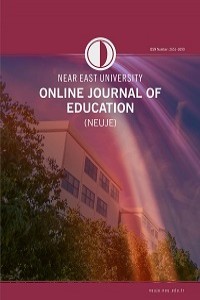AN INVESTIGATION INTO CONTENT EVALUATION OF PROGRAMS BETWEEN 2013 – 2018
AN INVESTIGATION INTO CONTENT EVALUATION OF PROGRAMS BETWEEN 2013 – 2018
content analysis evaluating programs, investigating,
___
- Berrang-Ford J. D., & Ford J. Paterson. (2011). Are we adopting to climate change?. Global Environment change, 21, 25-33
- Brain, M. (2014). What is teaching?. USA: Permalink Publishers
- Burns, R. (2000). Introduction to research methods. (4th ed.). London: Sage
- Cai, J., & Cirillo, M. (2014). What do we know about reasoning and proving? Opportunities and missing opportunities from curriculum analyses. International Journal Research, 64, 132-140
- Caswell, H. L., & Campbell, D. (1935). Curriculum Development. New York: American Book Company
- Cheng, C. (1997). Multi-models of quality in Education. Quality Assurance in Education, 5(1), 212-231
- Clemente, M., Ramirez, E., & Dominguez, B. (2000). The selection of contents in school projects in Spain. Curriculum Inquiry, 30(3), 295-317
- Coakes, S. J., & Steed, L. (2007). SPPS Version 14.0 for windows: Analysis without anguish. Milton: John Wiley & Sons
- Cohen, L., Manion, L., & Morrison, K. (2011). Research methods in education (7th ed.). London: Routledge
- Culbertson, H. M., & Sumerick, N. (1976, may 19). Cloaked attribution. What does it mean to Readers?. ANPA News Research Bulletin, 3
- Eisner, E. W. (2002). Those who ignore the past…12 ‘easy’ lessons for the next millennium. Journal of curriculum studies, 32(2) 343-357. Retrieved from: http://dx.doi.org/10.1080/002202700182808
- Evening, M. L. (2001). Media education Ile-Ife. University of Ife. Press Limited
- Glaser, B., & Strauss, A. (1967). The discovery of grounded Theory. Strategies for qualitative research. Chicago: Aldine
- Guba, E. S., & Lincoln,Y. S. (1994). Competing paradigms in qualitative research, 105-117. London Sage
- Gudmundsdottir, S. (1990). Values in pedagogical content knowledge. Journal of Teacher Education, 41(3), 44-52. Retrieved from: http://dx.doi.org/10.1177/002248719004100306
- Jones, K. O., & Reid, J. M. V. (2007). Modifying teaching to address thinking styles. ACM International conference proceedings series, vol. 285, proceedings of the 2007 International Conference on computer systems and technologies. Retrieved from: http://dx.doi.org/10.1145/1330598.1330682
- Skinner, B. (1964). Why we need teaching machine in educational technology. New York: Julia Klaus Ethrow Publications
- Stephen, G. (2014). Soft skills assessment: Theory development and the research agenda. International Journal of lifelong Education, 33(4), 455-471
- Strauss, A., & Corbin, J. (1998). Basic of qualitative research: Techniques and procedures for Developing grounded theory (2nd ed.). Thousand Oaks, CA: Sage
- Leathwood, C., & Phillips, D. (2000). Developing Curriculum evaluation research in higher education process: Politics and practicalities. Higher Education, 40, 313-330
- Lincoln, Y. S., & Guba, E. G. (1985). Naturalistic inquiry. Beverly Hills, CA: Sage
- Munby, H. (1990). Metaphorical expressions of teachers’ practical curriculum knowledge Journal of curriculum and supervision, 6(1), 18-30
- Ratsoy, E. W., & Bing, Z. (1999). Students participation in university governance. The Canadian Journal of Higher Education, 29(1), 1-26
- ISSN: 2651-3099
- Başlangıç: 2018
- Yayıncı: Yakın Doğu Üniversitesi
CONTENT ANALYSIS OF GUIDANCE AND PSYCHOLOGY - SPORTS AND RELATED ARTICLES
Engin Baysen, Philip Ezekiel CHALL DAKWO
Gulnoza IBRAGİMOVA, Umut AKÇIL
THE ROLE OF PHYSICAL EDUCATION FOR CHILDREN WITH SPECIAL NEEDS: A REVIEW STUDY
Basak BAGLAMA, Mukaddes SAKALLİ DEMİROK
AN INVESTIGATION INTO CONTENT EVALUATION OF PROGRAMS BETWEEN 2013 – 2018
Felix Danjuma TAPPİ, Cigdem HURSEN
USE OF COMPUTERS IN SPECIAL EDUCATION: BENEFITS AND OUTCOMES
Basak BAGLAMA, Yucehan YUCESOY
FLIPPED CLASSROOM IN LANGUAGE STUDIES: A CONTENT ANALYSIS OF RECENT ARTICLES
